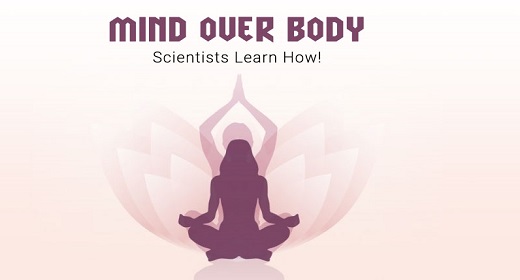by Dhruv Wahal: Two Opposing Views?
It is a popular notion in the scientific community that humans lack free will and are only misguided by the illusion of it. It is believed we are made up of tiny atoms that make our bodies as much as they make the stars in the sky. Imprisoned by scientific laws and subject to our DNA & the biochemical reactions in our bodies, our brains and bodies shape our lives.
A popular and contradictory view is one preached by religious and spiritual communities. They propose the existence of a consciousness that dwells within and without our bodies. It is the prime mover that shapes our lives and our bodies.
This aim of this article is to marry the two views backed by latest scientific research. We will present a case for how meditation (an exercise of the mind) can physically shape and change our brains, bodies and DNA. These have countless benefits in alleviating symptoms of depression and anxiety, relieving subjective experience of pain, boosting immunity, improving focus and attention; all of which can improve overall health and wellbeing.
The World We Adore is Depressed!
The world we live in is not too distant from how the dystopian writers imagined it. We live in a cesspool of social pressures that breed insecurities which result in undesirable effects in our subjective experience of life.
The world has never been this depressed. A World Health Organisation (WHO) report found that around 300 million people around the world are suffering from depression. Hence, curing and managing depression has been a key focus area for the scientific community and pharmaceutical companies. An article in Businesswire wrote that the global antidepressants market is at about 11 Billion USD! Clearly depression and related diseases are a problem that carry a heavy health and economical burden on the society. Here are some more stats to paint a vivid picture:

[Based on multiple sources]
Given the importance of this illness, all options must be explored to improve the mental wellbeing of those who suffer. We are starting to discover that the ancient practice of Meditation may have surprisingly positive effects
Being Zen
For thousands of years, people have practised meditation. There are religious and non-religious methods by which people meditate. Its positive effects have been discussed plenty socially through anecdotal references and via self-help “gurus”. However, it is only now that the scientific community has taken it upon itself to better understand the effects of meditation on the body and especially in the brain. In this article, we will journey through all the latest scientific studies that have explored how and if meditation can literally change the structures of our brains, our DNA and improve our health. Here’s an overview of the currently studied positive effects of meditation.
Possible Benefits of Meditation
- Improved Attention & Focus
- Mitigates Anxiety
- Improves Mental Wellbeing
- Helps Cure Depression
- Strengthens Immune System
- Increases Grey Matter in Brain
- Alleviates Pain
- Improves Heart Health
- Prevents Inflammatory Diseases
- Changes DNA
- Strengthens & Changes Brain Structures
Harvard is Curious, Should You Be Curious Too?
Harvard is the epitome of excellence in higher education and research. Recently, several studies and clinical trials have been carried out that have explored how a mindfulness-based meditation approach can be used to treat and manage depression. Benjamin Shapero, an instructor at Harvard Medical School (HMS) and a psychologist at Massachusetts General Hospital’s (MGH) Depression Clinical and Research Program is working with Gaelle Desbordes, who is an instructor in radiology at HMS and a neuroscientist at MGH’s Martinos Center for Biomedical Imaging and they have found some amazing results.
So, without throwing a lot of medical jargons at you, we will delineate simple steps that show what their team tried and tested. Have a look…
The Harvard Meditation Research Study
- Two Groups Of Patients: Control (Does Not Meditate) | Experimental (Undergoes Meditation)
- fMRI Scan of Both Groups (Brain Scans Based on Emotional Stimulus)
- 8 Week Mindfulness Meditation Course (For Experimental Group)
- fMRI Scan of Both Groups (Brain Scans Based on Emotional Stimulus)
- Compared Results of Both Groups
Here is the detailed version. An fMRI scan not only takes a picture of your brain, as an MRI would do, it also records brain activity during the scan. In 2012, Desbordes showed that changes in brain activity lasts even when people are not meditating (those who practice meditation). Essentially, the effects of meditation on the brain are long lasting. But what changes did this Harvard research studied exactly?
The Amygdala: The Almond Shaped Emotions Processor
The Amygdala is the part of the brain that is responsible for emotions processing and memory. A highly active amygdala would result in a person experiencing high symptoms of depression and stress.
Stress is the body’s response to a “Fight or Flight” situation and results in unwanted associated symptoms like headaches, upset stomach etc. The Relaxation Response is the opposite of the Fight or Flight response wherein the body secretes hormones that put us in a deep state of relaxation by engaging a part of our nervous system.
Essentially, Desbordes and her team aimed to test if increased body awareness in the moment (interoception) can help participants break the cycle of self-rumination. It is extremely difficult for depressed patients to break from the cycle of self-rumination and let go of obsessive thoughts.
The results were promising. The group that received the 8-week mindfulness meditation therapy showed relatively inactive amygdala in response to emotional images. This suggests that the art of mindful meditation allowed people to detach from strong negative emotions relatively easily overcoming depression symptoms. Here is an image from the study itself

Source: Harvard Gazette
Meditation Physically Changes The Brain!
The aforementioned study is just one example of how meditation brings about physical changes in your brain. The number of studies exploring the effects of meditation have increased significantly. The Harvard Gazette in a story mentioned that from 11 clinical studies from 2002-2006, there were an astounding 216 studies done from 2013-2015. The number has only increased since then and a lot of meaningful insights have been discovered. These studies have shown preliminary results that suggest meditation can change the following parts of the brain:
Meditation Changes These In The Brain
- Amygdala [Emotions Processing]
- Cerebral Cortex [Stress Related Areas]
- Hippocampus [Learning & Memory]
- Thalamus
- Prefrontal Cortex [Attention control]
- Parietal Lobes [Attention control]
- Limbic System [Process Emotions]
- Anterior Insula [Brings Emotions into Conscious Awareness]
A research study published in Psychiatry Research: Neuroimaging by a team led by Harvard-affiliated researchers at Massachusetts General Hospital marvelled at the brain’s plasticity (ability to be easily shaped). They have reported results in this study that document how meditation has produced changes over time in the brain’s grey matter.
Grey matter is an extremely important part of your central nervous centre. It consists most of the brain’s neuronal cell bodies and is responsible for important functions including muscle control, sensory perception, memory, seeing, hearing, emotions, speech, decision making and self-control.
Sara Lazar, a senior author of this study describes how after 8-weeks of mindfulness meditation (focusing on awareness of sensation, state of mind and feeling in a non-judgemental way) participants’ MRI scans showed increased grey matter in the hippocampus (important for memory & learning) and other structures associated with self-awareness, compassion and introspection.
Another study authored by Shirley Telles and team published in the Depression Research & Treatment journal explored how meditation can be used to manage mental health disorders resulting from trauma. While there are several substitute treatments like medicine etc. they bear undesirable effects, unlike Yoga and meditation.
Their research found similar results that confirmed Zen meditation causes changes in amygdala.
This results in increased serotonin levels (a chemical that contributed to wellbeing and happiness) & dopamine (a chemical responsible for concentration, motivation, euphoria etc.). Furthermore, changes in another neurotransmitter GABA (regulates communication between brain cells) improved the condition of PTSD patients. After meditations participants reported reduced level of stress, improved mood and other symptoms related to anxiety.
Tai Chi For the Elderly
As we grow older, the grey matter in our brain deteriorates. It is a natural process that eventually leads to cognitive impairment and other decreased mental functions. While this is a natural process that we cannot escape entirely, the latest study published in the journal Frontiers in Psychology might have provided some hope.
Researchers from the School of Psychology and Cognitive Science from East China Normal University found that a Chinese meditation technique called Tai Chi can over time reduce grey matter atrophy and thereby achieve successful ageing for elders. Their research showed that experienced meditators had higher GMV (Grey Matter Volume) of the thalamus and the hippocampus. Their research also revealed that high GMV results in improved emotional stability.
Our advice? Start meditation today so that when you are older, you are at least relatively better off. Our brain is the most important tool that deserves exercise much like our body to stay healthy and function optimally.
Another study published in PLoS One Journal by Gao-Xia Wei and found that Tai Chi meditation also affected the following areas in the brain:
- Precentral Gyrus [Muscle Control]
- Insula Sulcus [Emotions]
- Middle Frontal Sulcus [Semantic Processing]
- Superior Temporal Gyrus [Sensory Processing]
- Medial Occipito-Temporal Sulcus [Reading]
- Lingual Sulcus [Vision & Word Processing]
You needn’t concern yourself with terminology. All you need to know is that researchers in this PLoS One Study have successfully shown that Tai Chi meditation strengthens important parts of your brain and changes them physically.
It has long been known that physical activities and events can shape our brain. Proofs of the ability of purely mental activities to change the structure of our brains is truly a remarkable feat and deserve attention. Several studies point towards only one direction, meditation can have positive effects by literally changing the structure of our brain and even our neural connectivity.
Relapse No More!
Did You Know?
As per an article published in the Scientific American:
- 60% – With depressive episode will relapse
- 60% – 90% relapsed once will relapse again
- 95% – Three or more episodes will relapse
So far, we have seen how mindfulness meditation can change the physical structure of our brain and alleviate symptoms of depression, anxiety and PTSD. Mindfulness meditation helps change dysfunctional thoughts and prevents problematic emotions and behaviour. However, another common problem with patients suffering from depression is a relapse.
Preventing relapse is a crucial challenge for therapists. An article in the Scientific American revealed that up to 60% of those who have had one depressive episode will have one or more additional ones. They also revealed that those who have relapsed once, 60-90% of them will have further episodes. Finally, people who have experienced three or more depressive episodes, 95% of those will relapse! These are insanely high numbers and represent a huge challenge.
John Teasdale, a psychologist from the Medical Research Council (MRC) in Cambridge published a study in 2000 that concluded the potency of mindfulness as a preventive in patients who have relapsed three or more times. In 2004, the same study was replicated with a larger sample set by the renowned psychologist S. Helen Ma who deduced similar results.
People who have experienced three or more episodes of relapse form strong associations between ordinary negative moods and depressive thoughts. They cannot break away from their obsessive negative thoughts and anything can trigger a full-blown depressive episode. Helen found that with these people, mindfulness based cognitive therapy can be effective.
Moving Beyond Depression
We have clearly understood that regular meditation can reduce stress, improve attention & focus, bring emotional stability, reduce anxiety, manage depression and even change the very physical structure of our brain. However, mindfulness meditation has benefits beyond the brain that affect our biological health. The infographic shows all the currently researched and possible beneficial effects of meditation on the body.

Meditation Relieves Pain
A study published in the Journal of Neuroscience in 2011 concluded that mindfulness-based meditation can relieve pain. Fadel Zeidan of Wake Forest University along with his team scanned participants brains as they received uncomfortably hot touches to their legs. Those who practised meditation reported experiencing less pain when they simply focused on their breathing. The study found that there was increased activity in the lower region of the brain that controls signals coming from the body as well as the executive centres that evaluate experience and regulate emotions.
Researchers from Group Health Cooperative and the University of Washington studied the changes in lower-back symptoms after a Mindfulness-Based Stress Reduction therapy. Their study monitored the subjects of the study for over 6 months. They found that 61% of patients that practised meditation reported meaningful improvement in symptoms.
To summarise, the latest research suggests that through mindfulness-based meditation, people can mitigate their perception of pain and alleviate symptoms of chronic pain. Daily meditation can make you stronger and more resilient to pain. Expert meditators can command such control over their bodies that they feel no pain at all. The following is a famous picture that got featured on the cover of Time magazine in 2012. The picture shows Mohamed Bouazizi who set himself ablaze in the middle of the street in protest. It truly is bewildering how calmly and at peace the man sits while his body burns away to death.

Source: Time Magazine
Meditation Halves The Risk of Heart Attacks
Impact of heart diseases
- 9 Million people Died of heart diseases in 2016
- 31% of all global deaths
- 85% of these deaths were caused by heart attacks or strokes
- Cardiovascular Diseases (CVD) Costs likely to exceed 1 Trillion USD by 2035
- Economic Cost of CVD was 317 Billion USD in 2012
- $193 Billion Direct Expenses
- $123 Billion Due To Lost Productivity
Cardiovascular diseases cause the largest amounts of deaths in the world every year. Heart attacks alone kill about 9 million people. Clearly, this is a problem that needs a lot of attention. While there are countless research studies and clinical trials happening to treat CVD, one study has caught our eye.
Preventive medicine specialist Robert Schneider of the Maharishi University of Management collaborated with endocrinologist Theodore Kotchen of the Medical College of Wisconsin to study the effects of Transcendental Meditation (Mantra Chanting) on the risk of heart attacks. They enlisted 201 patients who have narrow coronary arteries. These people are at much higher risk of heart attacks.
Along with medication and other therapeutic measures, half of these patients practised 20 minutes of Transcendental Meditation. This research found over 5 years, the group that meditated experienced a staggering 47% fewer heart attacks, strokes and deaths caused by CVD. Drugs that reduce cholesterol levels reduce the risk of life-threatening events only by 30-40 percent. Whereas, common blood pressure drugs reduce these outcomes only by 25% to 30%. Meditation has shown to be clearly more effective.
The primary reason attributed to such drastic results is the sustained lower blood pressure because of meditation. However, it is important to note that all patients were African Americans and these results may or may not transfer to other ethnic groups that might have a lower risk of heart diseases.
Meditate Your Cold Away
A new study published in the Annals of Family Medicine found that meditation and exercise are effective tools in fighting your cold away. 150 participants were divided into three groups. One group engaged in mindfulness meditation for 8 weeks. The second group did 8 weeks of brisk walking and jogging. The control group did neither. Here are the results that the researchers found.
Meditation can cure your cold
- Those Who Meditated: Missed 76% Fewer Work Days
- Those Who Exercised: Missed 48% Fewer Work Days
- Cold Lasted on Average For Both Groups for 5 Dyas
- Control Group Experienced Cold on Average for 8 Days
- Level of Antibodies correlated with self-reported lengths of cold
While these results are exciting, it is important to remember that they are only preliminary and further research is required to make more substantial claims.
Meditation Changes Your Genes (DNA)
Our genes have an extremely large impact on who we are, our appearance, our predisposition to certain diseases etc. A systematic review of 18 trials that included 846 participants found that mindfulness-based meditation or Tai Chi meditation can influence gene activity and has countless benefits.
Ivan Buric, a psychologist from Coventry University’s Brain, Belief and Behaviour lab along with her team have found that a gene called NF -kappaB responsible (acts as an “on switch”) for many inflammatory diseases is affected by such meditative practices. They have published their research in the Journal Frontiers in Immunology where they have reported their findings.
Inflammation acts as the body’s first line of defence against infections and injuries. However, if switched on for a long time, it can result in increased risk of developing chronic inflammation associated diseases like arthritis, asthma, neurodegenerative diseases, cardiovascular diseases and even some types of cancer.
Meditation showed that the gene responsible for triggering chronic inflammation and related diseases becomes less active. This suggests that meditation can bring changes in your DNA that can at least prevent if not fully cure chronic inflammatory illnesses.
Another study published in the journal Cancer led by a Canadian group found that mindfulness-based meditation helped prevent chromosomal deterioration in some cancer patients. This too reduces the risk of inflammation-related diseases in your body.
Meditation Strengthens Your Immune System
Harvard researcher Herbert Benson is the man that discovered the Reflection Response that we spoke of earlier in this article. In the 1980s his visits to remote monasteries allowed him to gain some truly exceptional insights.
He found that monks that practised Tum-mo meditation in the Himalayan Mountains could increase the temperature of their fingers and toes by almost 17%! He was shocked when he realised these monks could also reduce their metabolism by 64% as compared to 10-15% fall when we sleep.
This truly is a wonderful example of the concept of mind over body. Now, a new study published by researchers from the Netherlands found that volunteers could be taught to control their sympathetic nervous system. This is the part that controls the fight-or-flight response along with the immune response to a limited extent.
Once trained, all volunteers were exposed to toxins that would create flu-like symptoms. Surprisingly, the group that practised meditation showed signs of improved immunity and even produced higher inflammation-fighting proteins called interleukin-10. This serves as yet another example of the ability of the mind to cause physical changes in the body.
Meditation Might Make You Smarter
While there aren’t many conclusive studies that suggest meditation makes you smarter, there are a few that are worth noting here:
- Research published in Frontiers in Psychology by a team from Tel Aviv found that adults with developmental dyslexia and ADHD made fewer errors when reading as an effect of a mindfulness-based stress reduction intervention
- Michael Posner and Yi-Yuan Tang found in their latest research study that similar meditation practices increased performance on the Raven’s progressive matrix which is a measure of fluid intelligence (the ability to identify patterns and solve novel problems)
- Another study published in Frontiers of Psychology by researchers from the University of Rome and the University of Udine in Italy found that meditation may even improve creativity in certain manners and contexts. For example, by practising mindfulness meditation, people train to drop their predispositions and are hence able to perform well on tests that required new ideas, more flexibility, fluency and originality of response.
- A Japanese study published in PLos One found that regular practice of mindfulness meditation results in higher job performance including higher work engagement, improved subjective job performance and job satisfaction.
These studies are some examples of the continued research in understanding the positive effects meditation might have on intelligence. There are some supporting studies that suggest meditation might make you smarter. However, further research is required to make this claim conclusively.
A Word of Caution
While reading this article, you might have felt overwhelmed with the abundance of positive effects meditation might have in your brain, body and health. These studies do support the most hypothesis and some have shown credible evidence to support all the benefits of mindfulness-based meditation.
It is, however, important to realise that there are some limitations to these studies that should be accounted for. To address these issues a study carried out by John Hopkins University researchers reviewed published clinical trials on this subject. Madhav Goyal and his colleagues identified 47 clinical trials that investigated the effects of meditation of individuals with diagnosed health problems.
They published their results in the JAMA Internal Medicine journal and concluded the following:
- Moderate evidence for the alleviation of pain, anxiety and depression
- Not enough evidence for other conclusions
- Many studies had small sample sizes
- Many studies had an issue with quality
Based on this Johns Hopkins University study, it is important to not think of mindfulness meditation as a magical technique that will cure all illnesses and solve all problems. It is a tool that is to be used correctly and regularly to benefit from its positive effects. If practised regularly, it can definitely improve your subjective wellbeing.
However, an article in the Scientific American discusses how meditation can even have undesirable effects. Philosopher Owen Flanagan, who is a fan of Buddhism and meditation said that many western Buddhists come off as passive-aggressive. Some studies even suggest that yoga and related meditation techniques can elevate your self-esteem to a level that it comes off more narcissistic than anything else.
The Final Word
At the Annual Meeting of the Society for Neuroscience in Washington, the Dalai Lama gave the inaugural dialogue between Neuroscience and Society. He said that meditation, even for him is hard work. He meditates for 4 hours every morning to benefit from it. He admirably said that if neuroscientists and researches could stimulate the same feeling he achieves by meditation artificially, he would happily be a volunteer for such an experiment.
This anecdote brilliantly sums up the importance of meditation and the scientific community. Meditation for thousands of years has been practised as a spiritual or religious practice. For a very long-time science stayed away from studying meditation for this precise fact. It clearly has positive effects on our body and mind, else the tradition would have withered and died as all redundant ideas do. However, the tide is turning, and more researchers are exploring the benefits of meditation on our health, brain and bodies.
The scientific community must come together with expert meditators to benefit from the synergies of their respective knowledge so that they can finally unlock the mysteries of our bodies and minds.















































